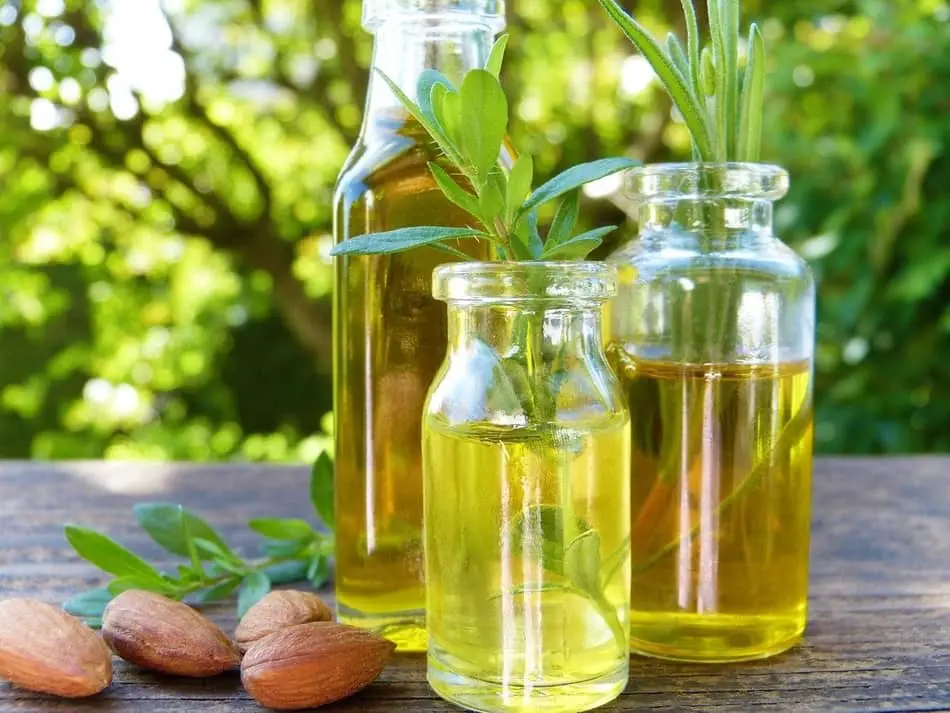If you are looking for an alternative to protect your leather goods, and want to know whether or not almond oil is good for leather, then this article will be perfect for you. We will go through the pros and cons of using almond oil on your leather items. You’ll find out what it does well, how it can potentially harm your product if applied incorrectly, and everything in between.
So is almond oil good for leather? Almond oil can be used on leather because it is a natural oil, safe, and a good way to make leather soft and supple. Almond oil when applied to leather has very good absorption. The main downside to using almond oil on leather is that it can go rancid if the oil itself hasn’t been stored properly.
To learn more about the pros, cons and the proper way of using almond oil on leather items, keep reading this article.
The Pros Of Using Almond Oil On Leather
1. It’s Natural And Eco-Friendly
One of the main advantages of using almond oil on leather is the fact that it is natural and edible, making it eco-friendly.
Meaning you wouldn’t have to be concerned about exposing harmful substances that may be included in some leather care products to your leather items like couches or leather seats – which can possibly find their way into the mouth of your little ones or furry friends.
This makes it fun and enjoyable to use your comfy leather items without stressing about what is on them – except ofcourse you’re allergic to almonds.
Almond oil is often found in leather care products like saddle soap, balm, and some leather conditioners.
2. Almond Oil Makes Leather Supple And Soft
Almond oil has a high level of linoleic acid – an omega fat that is healthy for natural skins.
This ingredient in almond oil is key and can help to keep leather looking supple, soft, and shiny while preventing it from drying out quickly like other oils do because they are too heavy or greasy in texture.
This means you would have the benefit of using a product which not only protects your investment (ie leather goods) but also helps it maintain its good looks!
3. Great Absorption
Another advantage of using almond oil on leather is how well it absorbs into the leather material without leaving any residue behind after use.
This is important because it helps to prevent the build-up of sticky residue on the surface of the leather. It also doesn’t leave stains as some might suggest due to their darker colorings.
The reason why almond oil absorbs well into leather is due to its light, non-greasy texture.
The natural properties of almond oil allow it to penetrate deep into the leather giving it a beautiful long lasting and even finish, while also preventing other possible damages like drying, cracking, or peeling.
This is important because you do not want to put any oil that can clog the pores on leather to prevent the leather from being breathable – as leather is naturally meant to be.
4. Almond Oil Gives Leather A Protective Layer
Almond oil can offer leather a protective leather because of its natural properties.
Although the best way of protecting your leather goods by far is by cleaning and conditioning them regularly, using almond oil will give the leather item a protective layer that will prevent further damage from occurring over time.
The oils also add an extra shine to make your items look more beautiful as well!
So if you’re after something organic you can use to protect your leather goods, almond oil is a natural product that can offer your leather goods that level of protection.
If you particularly want the best of both worlds with regards to protection from water damage as well as protection against sunlight – almond oil would make an excellent choice because it has these properties too.
Exposing leather goods directly to sunlight without any form of care or protection becomes more apparent over time when they start cracking, peeling, discoloring, etc.
Almond Oil helps prevent this problem by providing some level UV light protection!
5. Almond Oil Can Be Used To Restore Leather
If you’re home and you start noticing a leather item of yours is begining to dry up and you do not have any leather restoration products readily available, you can use almond oil to to help revive your old leather items.
While using almond oil is not going to be a premenant fix for your old leather goods, what it can actually do for your old leather items is to restore the original color of your leather goods, make it supple, and prevent any additional damages.
This is to say almond oil can be a temporary fix but will not be as good as other specially formulated leather care products.
The Cons Of Using Almond Oil On Leather
1. Almond Oil Can Go Rancid
In most cases, one of the common problems you will face when you use almond oil on your leather items is that it could go rancid.
Almond oil can go rancid because first of all, it is natural oil. Also, almond oil may go rancid if it’s left out for too long and exposed to heat, air, or light.
The most important thing to do in order to prevent the almond oil from going rancid on your leather goods is by storing them properly after each use so they are not subjected to any of the elements that could cause the nutty flavor of almond oil to change over time.
So what you essentially need to do is to make sure you check the condition of the almond oil you apply on the surface of your precious leather goods.
Another important reason why almond oil may go rancid on your leather goods is primarily due to its fairly low melting temperature.
These low melting point makes it subject to oxidation that can lead to spoilage or rancidity on your leather goods. This is why walnut oil and coconut oil will by far be a better natural oil alternative to leather.
2. Almond Oil Application Is A Temporal Fix
One of the disadvantages to using almond oil on leather is that it does not provide a long-term fix especially for old leather goods.
Almond oil will not be able to give your leather items the long-term fix you will need to give your leather – like the one you would get from a high-quality leather conditioner or protector.
3. Almond Oil Tends To Be Runny
Another disadvantage is that it can be difficult to apply the oil on all parts of your old, damaged leather items without getting any excess or dripping onto your clothes and furniture.
Almond oil is likely to be runny when it’s being applied on leather because of its consistency.
So the likelihood of almond oil leaving sticky residue on your leather and hands after applying it to your leather goods such as shoes, purses, belts, etc. is high.
4. Almond Oil Has Peculiar Smell
Not everyone is a fan of almond oil smell due to how somewhat strong smelling it is.
The strong smell of almond oil can be a huge disadvantage if you’re allergic to it.
I personally have no problems with using almond oil sometimes for my boots but I have had a couple of people who find the scent of sweet almonds overwhelming and unpleasant.
5. Almond Oil Stains Can Be Hard To Remove
It is very important that you are careful not to spill any almond oil on your clothes or furniture while applying it on your leather goods.
This is because almond oil will leave an obvious stain that’s hard to remove without damaging the material it gets on.
How To Use Almond Oil On Leather
Applying almond oil in general is pretty easy to do. You can use almond oil to treat your leather by:
Things Needed:
- Almond Oil
- Microfiber Cloth
Procedure:
Step 1:
- Load your microfiber cloth with a liberal amount of almond oil. You want to be sure the cloth or rag is not runny.
- Meaning you want to be sure that the cloth is not so saturated with almond oil that it drips.
Steps 2:
- Now rub the microfiber-soaked-rag over the surface of your leather to begin the treatment process you’re intending to do.
- You particularly want to make sure to rub the rag in on the surface of the leather in a circular motion while using only light pressure.
- Make sure to apply the almond oil on the surface of the leather as thorough as you can.
Step 3:
- Clean off any excess almond oil from the surface of your leather goods by gently wiping with an absorbent microfiber or cotton cloth.
Step 4:
- Leave the application to air-dry overnight.
Step 5:
- Apply almond oil about once every 30-60 days for maximum benefits and protection.

